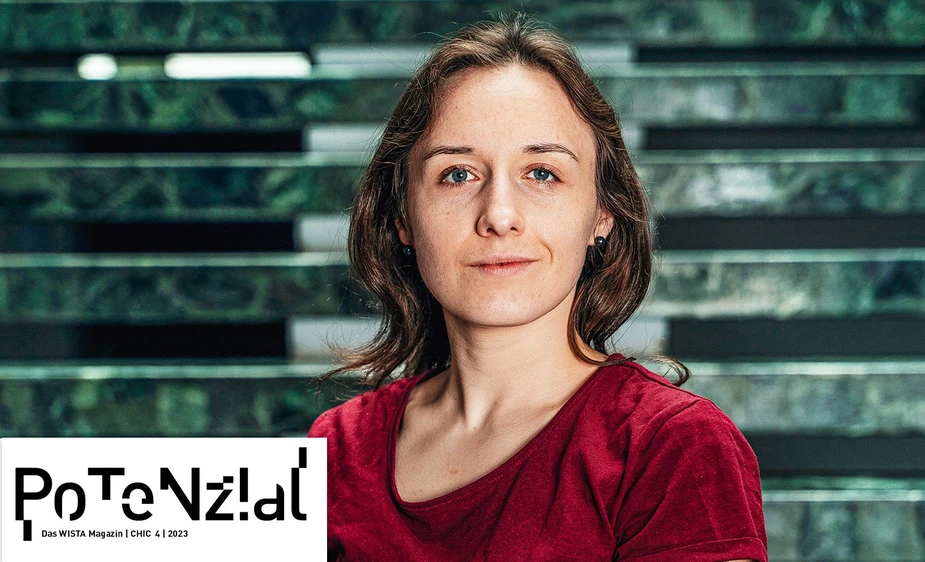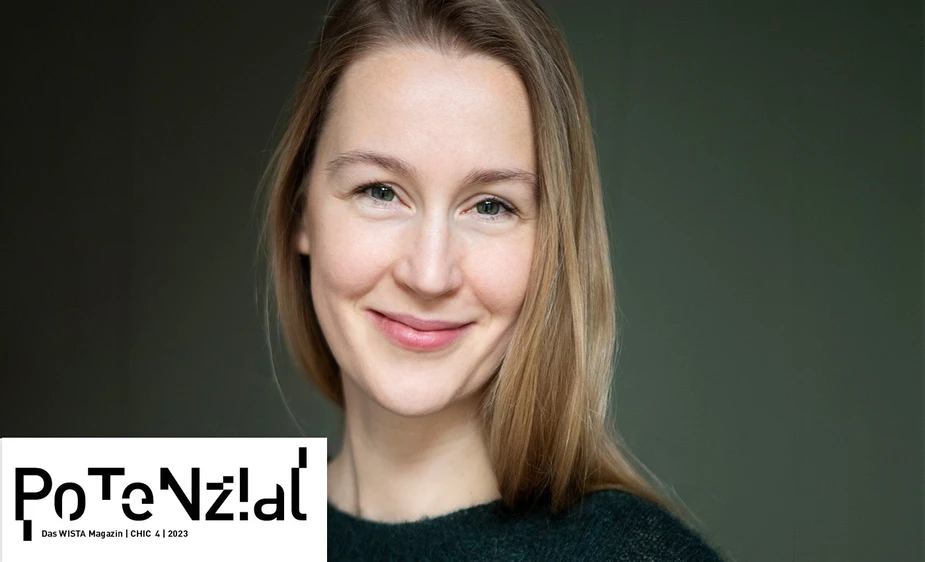Collaborative and well-connected
CHIC location manager Olivia Budek supports female founders and strengthens their networking in the capital region
More than 80 percent of all start-ups in Germany are backed by male founders. Against this backdrop, Olivia Budek, the manager of the Charlottenburg Innovation Centre (CHIC), is paying special attention to female founders and bringing them closer together across the capital region. To her colleagues and herself, it’s all about a spirit of collaboration, sharing knowledge, and empowerment.
Is there a German word that has the complex layers of meaning of the English word “empowerment”? It would have to be able to express gaining strength and ability as well as the self-confidence that results from it – an underlying notion of emancipation and agency as well as a rebellion against the prevailing, hierarchical conditions. Such a word does not exist. Maybe this is a symptom of a deeper cause, namely, the low number of female founders in Germany’s start-up scene. Current studies estimate the share at 15 to 20 percent. However, every second university student in this country is female. Professional attainment can therefore not be the reason why many more men than women dare to make the step into founding a business. Olivia Budek, who is the manager of CHIC, is actively searching for ways to address this discrepancy. “We originally tried to do so with a female founder meet-up at CHIC,” she says.
However, it quickly became clear that this format did not produce long-term, tangible results. What was needed was a concrete mutual support system that focused on specific topics. The result was an event format in which successful female founders and experts share their know-how on how to use artificial intelligence, how to approach investors, and how to build up business structures. “Our participants leave with targeted responses to their questions. The speakers establish themselves as competent and successful female role models, leaving a lasting impression,” says Budek. Up to 40 guests typically come to these events. People of all genders are invited. Moreover, people beyond the existing WISTA networks are also explicitly invited. The aim is to foster networking across the entire capital region.
Many of the diverse business founders sitting on CHIC’s management benches are women. Among them are those of AGENTS HQ GmbH, which filters out fully automated, precise information for its customers from the global data tsunami. Or the educational tech start-ups complori, VINYA E-Learning, and Historicity. Women are at the helm at DigiMind and 1000 Kelvin, which both use AI to optimise 3D printing processes and sustainable packaging design, or at zixio GmbH, which is specialised in cognitive systems and knowledge networks. Sometimes, they work in teams with male founders, sometimes as the sole executives.
Olivia Budek is now also increasingly reaching non-WISTA founders with initiatives like the Ladies Network Adlershof (LaNA) and event formats like Female Founders Events. One of them was Melanie Eckert, co-founder of Krisenchat gGmbH. Her non-profit company, too, builds on the spirit of empowerment and support from sustainable networks. Its offerings are aimed at young people in mental health crises, a group that has grown in size markedly as a result of the pervasive impact of social media and, once more, of the pandemic.
Public support systems are not designed for such a high number of affected individuals and in-patient services are completely overbooked. Therapists have long waiting lists. To be able to offer emergency assistance, the team surrounding Eckert is transferring the traditional concept of the crisis hotline into the digital chat format that is much more suited towards the target group. Over 300 volunteers – all of whom are trained professionals – are now carrying out up to 4,000 consultations on the platform every month. “Sometimes they just listen, and sometimes they develop initial approaches towards solutions and plans for how to find medical care or therapy,” she explains. However, it’s also about empowering people and helping them to find the courage for seeking help in spite of their depression or anxiety disorder.
At the same time, Krisenchat is active on social media to de-stigmatise mental illness and crises. “We are trying to bridge the gap between established support systems in the analogue world to the digital living environments where the young generation can be found,” she says. To do so, the team is relying on collaborations with streamers and influencers, using their reach to inform as many young people as possible about the donation-based offerings of Krisenchat. So far, money has been coming from private individuals as well as businesses. Eckert says that talks about its institutionalisation with policymakers and health insurance providers are already underway. The demand is rising: 100,000 consultation chats have already been carried out and the frequency is growing parallel to how well-known the platform is becoming. Over 100 employees are working on the team to organise all this. It is often a matter of life and death. A fifth of young people turning towards Krisenchat have suicidal thoughts.
Eckert founded the company with one other woman and four men. The team is also diverse regarding age and occupation. Nonetheless, she rates formats like Female Founders Events highly: “The threshold is lower to go there without knowing anybody. And there is less rivalry in an exchange with just women,” she says. Instead, she perceived the spirit at these meet-ups as collaborative and empowering. Shared knowledge makes you twice as strong. Maybe this is a formula to express in German what the English term empowerment is all about.
Peter Trechow for POTENZIAL

